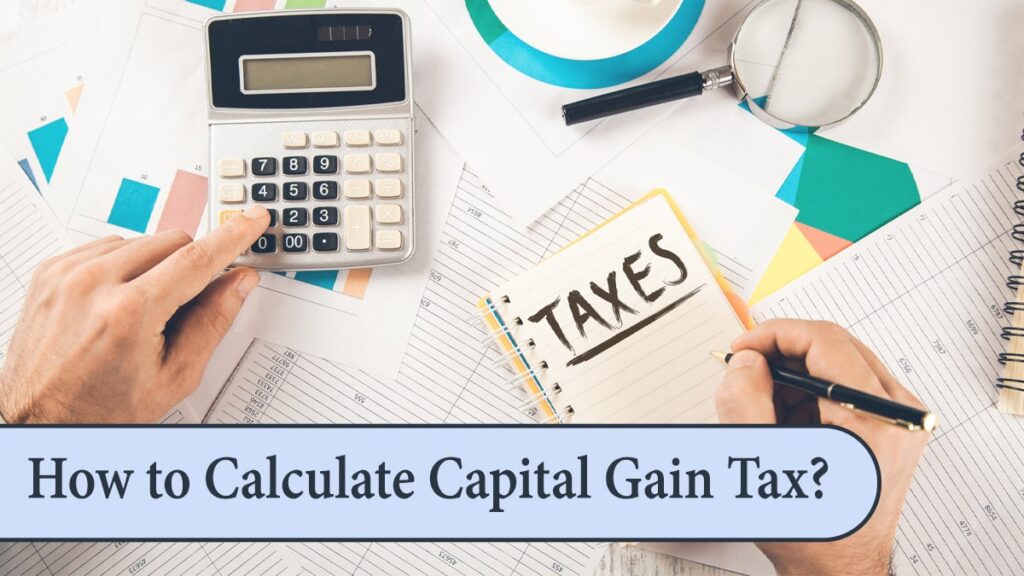For any economy to flourish a good taxation system is implemented and as the 5th largest economy in the world, India also has a taxation system integral to its financial activities.
The basic principle of taxation says that whenever someone sells an asset, he/she is liable to be taxed by the Government wherein a certain percentage of the profit is to be shared with the Government.
In this article, we will discuss how to calculate Capital Gain Tax, Types of Capital gain, tax exemption, and much more.
But first, let’s find out what is Capital Gain Tax.

Table of Contents
What is Capital Gain Tax?
Capital Gain Tax is a tax that is implied on the profit earned when you sell off your Capital Asset. Basically, it’s the difference between the purchased asset and the transacted asset, whatever the difference comes is the profit on which the taxation will be charged.
If the amount of your purchase is higher than what you sold off for then you are in Capital Loss however, if your purchased asset is low and your sold-off asset is high then you are in Capital Gain which is subject to tax.
Types of Capital Gain Tax
The Capital Gain Tax can be further categorized into two categories and the taxation of these will be different. This categorization is time bound meaning the holding of the asset plays a crucial role in determining the category on which the Capital Gain tax will fall.
Short-term Capital Gain Tax
Short-term Capital Gain Tax or STCG is a capital gain that is earned by a person within 36 months, this implies that the asset is held by the person for less than 36 months. In the case of immovable property, the time limit is 24 months.
Long-term Capital Gain Tax
Long-term Capital Gain Tax or LTCG is a capital gain earned by holding on to the asset for more than 36 months before selling it off to earn a profit. The taxation on this type of Capital Gain is taxed accordingly to the applicable rates.
Tax Rates for Capital Gain
The following are the tax rates applicable to the Capital Gain-
Capital Gain Tax on Assets (Other than Equity and Debt Assets)
| Type of Tax | Condition | Applicable Tax |
| Long-term Capital Gains Tax | Sale of Equity shares Sale of units of equity-oriented mutual fund | 10% over and above Rs 1 lakh |
| Others | 20% | |
| Short-term Capital Gains Tax | When Securities Transaction Tax isn’t applicable | Normal Tax Slab Rates |
| When STT is applicable | 15% |
Equity and Debt Mutual Funds Capital Gains Tax
| Type of Funds | Short-Term Gains | Long-Term Gains |
| Debt Funds | At tax slab rates of the individual | At tax slab rates of the individual |
| Equity Funds | 15% | 10% over and above Rs 1 lakh without indexation |
How to Calculate Capital Gain Tax?
The calculation of the Capital Gain is usually done by making a distinction on the type of capital gain that has been incurred. The following are the details
Formula to Calculate Short-term Capital Gain
Short-term Capital Gain = Full value of consideration – Expenses incurred on transferring the asset – Cost of acquisition – Cost of improvement
Example-
This can be best understood by taking an example, suppose you purchased 100 shares of a company on January 1, 2023, for Rs.2,000 per share and you sold these shares for RS.2,500 per share on March 1, 2023.
During this period you have incurred brokerage fees of Rs.1000/- as an expense. So in this scenario, the applicable short-term Capital gain is as follows-
Short-term Capital Gain = (100 shares * RS.2,500 per share) – (RS.1,000 brokerage fees) – (100 shares * RS.2,000 per share) – RS.0
Short-term Capital Gain = RS.49,000
Now, the tax liability is Rs.49,000 and the calculation of the taxation will be on this amount only.
Formula to Calculate Long-term Capital Gain
Long-term Capital Gain = Full value of consideration – Expenses incurred in transferring the asset – Indexed cost of acquisition – Indexed cost of improvement – Expenses allowed to be deducted from the full value of consideration – Exemptions available under Sections 54, 54EC, 54B, 54F, etc.
Example-
Suppose you purchased a residential property on April 1, 2010, at a cost of Rs.30,00,000 and now on October 1, 2023, you sold this property for Rs.60,00,000. During the holding period, you incurred Rs.50,000 in brokerage fees and made Rs.2,00,000 in improvements to the property.
For the calculation, let’s assume that you don’t have any deductions or exemptions available under Sections 54, 54EC, 54B, or 54F. So in this scenario, the applicable long-term Capital gain is as follows-
Calculate the Cost of Acquisition:
The cost of acquisition is Rs.30,00,000, and the property was sold in October 2023. The cost inflation index (CII) for the financial year 2010-11 was 711, and for the financial year 2023-24, it was 1161.
Indexed Cost of Acquisition = (Cost of Acquisition) x (CII of the Year of Sale) / (CII of the Year of Purchase)
Indexed Cost of Acquisition ≈ Rs.48,94,141.75
Calculate the indexed cost of improvement:
The cost of the improvement is Rs.2,00,000, and we’ll use the same CII values as above.
Indexed Cost of Improvement = (Cost of Improvement) x (CII of the Year of Sale) / (CII of the Year of Purchase)
Indexed Cost of Improvement = (Rs.2,00,000) x (1161) / (711)
Indexed Cost of Improvement ≈ Rs.3,26,402.82
Calculate the long-term capital gain:
Long-term Capital Gain = Rs.60,00,000 (Full value of consideration) – Rs.50,000 (Expenses incurred in transferring the asset) – Rs.48,94,141.75 (Indexed cost of acquisition) – Rs.3,26,402.82 (Indexed cost of improvement) – Rs.0 (Expenses allowed to be deducted) – Rs.0 (Exemptions available)
Long-term Capital Gain ≈ Rs.7,29,455.43/-
Now, the tax liability is Rs.7,29,455.43/- and the calculation of the Long-term Capital Gain taxation will be on this amount only.
Understanding the Terminology
The above calculation included some terminology that is important for you to understand. The following are some of the terminology which has been used-
Indexed Cost of Acquisition
Cost of Acquisition is a benefit provided to the assessment while calculating the Long-term Capital Gain.
By indexing the cost, inflation adjustment is done by which cost is increased, which results in lower capital gain tax. When you add the cost, inflation, etc. factors into the calculation of the overall capital gain tax, your liability gets lowered.
Indexed Cost of Improvement
The cost of Improvement is a factor of consideration while calculating the Capital Gain. This factor takes any cost incurred for the maintenance of the asset like renovation cost, repairs, etc.
Expenses Deducted
For selling the asset, if you have incurred any expense like commission, brokerage fees, platform fees, etc. can be considered to adjust it against your tax liability and you can subtract it from it.
Tax Exemptions on Capital Gains
According to the Income Tax Act, there are several provision and section that talks about the exemptions to the Capital Gain. You can reduce your burden on taxation by availing of these exemptions. The following are the tax exemptions on Capital Gains-
Section 54
This section talks about the exemption that you can get in case of selling your residential property and reinvesting that money into purchasing another residential property.
There is a maximum limit of two residential properties that you can purchase with this amount and the Capital gain accumulated must not be more than 2 Crore.
Section 54F
This exemption is for those assets which are other than the residential property specifically, the Long-term Capital Gain Asset which is not a residential property.
To avail of this exemption, the individual must reinvest the amount (including the capital gain) to purchase a new property. Such a purchase should be made 12 months before the sale or at least 24 months post-sale.
Section 54EC
This section talks about the exemption provided when you make a sale of an existing residential property and reinvest the money into purchasing a particular bond within six months. Such purchase of the bonds can only be redeemed after 60 months.
Section B
This exemption can be availed when you are transferring Land that is used for agricultural purposes. There are several conditions that you must fulfill to enjoy the exemption on the taxes which are as follows-
- The transfer of property has to be 24 months before the sale of the said asset
- The exempted amount must be reinvested to purchase a new asset within 36 months from the date of such transfer
- The property that is to be bought with the proceeds should not be sold within 36 months of acquisition
FAQ
The Short-term Capital Gain is payable at the rate of 10% for all holdings and Long-term capital gains are not payable on equity Mutual Funds, however, you’ll have to declare the income while filling out your Income Tax Returns. The profit earned for non-equity or debt MF will attract a tax rate of 20% with indexation benefits.
The capital gain will not be charged to an individual if the individual is above the age of 55.
In case of late payment of the Capital Gain tax, a penalty amount of Rs.10,000 is imposed for late payment. For companies, the penalty amount will be Rs.200 per day of delay.
I’m Shiv Kumar, a graduate with a passion for finance, marketing, and technology. My journey into finance started with a desire to understand money management and investing.
Our main goal is to empower individuals through financial education. We believe that everyone should have the opportunity to build a strong financial foundation. Whether you’re a seasoned investor or just getting started, we provide articles, guides, and resources to help you navigate the financial landscape.
I invite you to join our community of financially savvy individuals. Feel free to ask questions, engage with our content, and explore the topics that matter to you. Together, let’s take control of our financial futures.




